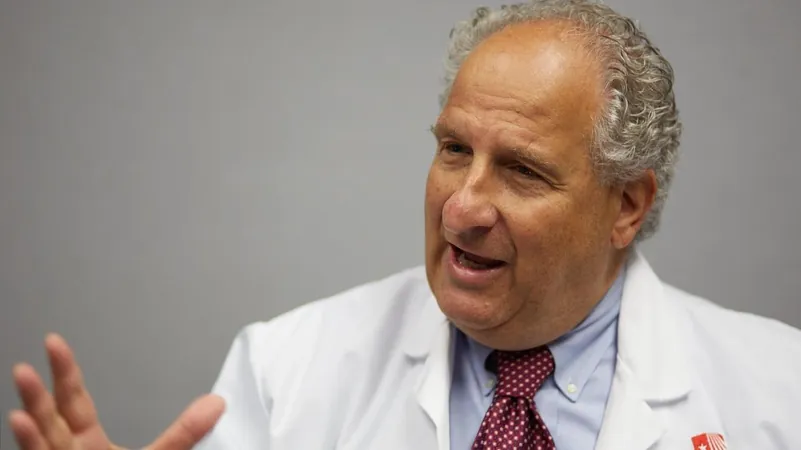
Shocking Study Uncovers Major Risk Factors for Long COVID: Are You at Risk?
2025-01-15
Author: Wai
Groundbreaking Study Reveals Long COVID Risks
A groundbreaking study conducted by researchers at Stony Brook University has shed light on critical risk factors associated with long COVID, revealing alarming insights that could affect anyone who has contracted the virus.
Study Findings
The study, which examined 2,522 individuals who tested positive for COVID-19 between March 2020 and February 2024, found that nearly 18% (475 participants) developed long COVID. Intriguingly, around 85% of those diagnosed with long COVID had experienced multiple infections—a stark warning sign for those who’ve faced COVID-19 more than once.
This research was carried out by the Renaissance School of Medicine in collaboration with the Stony Brook World Trade Center Health and Wellness Program, aimed at monitoring health issues linked to the 9/11 attacks. This unique sample of nearly all essential workers, primarily first responders, offers a window into the risk factors that could impact similar demographics in different settings.
Correlations with Vaccination and Infection Severity
The paper, published in "The Lancet Regional Health-Americas," emphasized the striking correlation between long COVID and factors such as prior vaccination status and severity of initial infections. Alarmingly, a significant number of participants who were unvaccinated when they first contracted COVID reported long-lasting symptoms that categorized them as having long COVID.
Sean Clouston, the study's lead author and a professor at the Renaissance School of Medicine, pointed out that while various pre-existing health conditions were considered, age and gender seemed to have less influence on the risk, suggesting that the severity of COVID itself played a more crucial role. He noted, "We had some younger individuals who faced severe COVID associated with a higher risk of long COVID. It really wasn’t the age anymore; it was the severity of the COVID infection."
Understanding Long COVID
Long COVID, or post-acute sequelae, includes a wide range of debilitating symptoms—mental fog, chest pain, persistent coughs, and loss or alteration of taste and smell—affecting those who show continuing symptoms as far out as three months after initial infection. Experts are increasingly vocal about the importance of ongoing research into long COVID, as the public perception shifts from fearing immediate death and severe illness to grappling with the long-term effects of the disease.
Evolving Concerns and Need for Solutions
Dr. Reynold A. Panettiere, Jr., vice chancellor at the Rutgers Institute for Translational Medicine and Science, highlighted the evolution of concerns, stating, "Long COVID is now the threat. Before, it was death. Now, if you get reinfected, you face a higher potential for long COVID and its sustained symptoms."
While vaccines have proven effective in reducing severe COVID cases and fatalities, experts like Dr. Benjamin Luft, co-author of the study and infectious disease specialist, emphasized that vaccinations alone do not prevent all infections. Luft warned, "Long COVID-19 has been so debilitating that we need effective solutions—vaccines or therapeutics—that directly combat long COVID's impacts."
Current Vaccine Uptake
Despite initial enthusiasm, recent years have seen a decline in vaccine uptake, with many people expressing dissatisfaction over vaccines' inability to prevent infections entirely. However, 2024 saw a slight increase in vaccination rates, highlighting an opportunity for renewed dialogue around improving vaccine efficacy.
Call for Action
Instead of opting out of vaccination, experts now advocate demanding advances in vaccine development. As Dr. Luft compellingly stated, "People should be asking for a better vaccine—one that prevents infection. We desperately need new and better strategies for the next generation of vaccines."
The urgency for robust vaccination strategies and better understanding of long COVID risks is clear. Will you take action to protect yourself from the hidden dangers of reinfection? Don't ignore the signs—stay informed and stay healthy!


 Brasil (PT)
Brasil (PT)
 Canada (EN)
Canada (EN)
 Chile (ES)
Chile (ES)
 Česko (CS)
Česko (CS)
 대한민국 (KO)
대한민국 (KO)
 España (ES)
España (ES)
 France (FR)
France (FR)
 Hong Kong (EN)
Hong Kong (EN)
 Italia (IT)
Italia (IT)
 日本 (JA)
日本 (JA)
 Magyarország (HU)
Magyarország (HU)
 Norge (NO)
Norge (NO)
 Polska (PL)
Polska (PL)
 Schweiz (DE)
Schweiz (DE)
 Singapore (EN)
Singapore (EN)
 Sverige (SV)
Sverige (SV)
 Suomi (FI)
Suomi (FI)
 Türkiye (TR)
Türkiye (TR)
 الإمارات العربية المتحدة (AR)
الإمارات العربية المتحدة (AR)